Thomas Sankara (1949-1987) was a revolutionary, pan-Africanist and internationalist. He became President of Burkina Faso in 1983 in a coup, and was assassinated in 1987 in a Western (CIA) backed plot. His successor, Blaise Compaoré, was likely involved in the murder, and was ousted in 2014 after 27 years in office. In 2021, Compaoré was tried in his absence before a military court on suspicion of involvement in the assassination of Sankara.
Random Quotes
Wrong!
Unfortunately wrong answer.
Try again!
The answer was
OK
This struggle to defend the trees and forests is above all a struggle against imperialism. Imperialism is the arsonist setting fire to our forests and our savannahs.
Correct!
This struggle to defend the trees and forests is above all a struggle against imperialism. Imperialism is the arsonist setting fire to our forests and our savannahs.
Year:
Author Bio:
Source:
The Militant (14.02.2022): Thomas Sankara spoke for the oppressed all over the world.
Context:
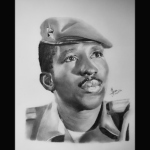 Sankara brought together issues such as gender, the environment and democracy with criticism of colonial domination. Sankara’s government contained more women than that of any other African country, and his bodyguards were women on motorcycles. He forbade circumcision and polygamy and promoted contraception. During his rule, state luxury cars were sold and cheap vehicles purchased in their place, education and health care were improved, land reform was carried out, reforestation was promoted and international development aid rejected.
Sankara brought together issues such as gender, the environment and democracy with criticism of colonial domination. Sankara’s government contained more women than that of any other African country, and his bodyguards were women on motorcycles. He forbade circumcision and polygamy and promoted contraception. During his rule, state luxury cars were sold and cheap vehicles purchased in their place, education and health care were improved, land reform was carried out, reforestation was promoted and international development aid rejected.
Further Reading:
The Guardian (11.10.2021): Trial Opens in Burkina Faso over Killing of Revolutionary Hero Thomas Sankara.
OK
1. Men are born and remain free and equal in rights. Social distinctions may be based only on considerations of the common good. 2. The aim of every political association is the preservation of the natural and imprescriptible rights of Man. These rights are Liberty, Property, Safety and Resistance to Oppression. 3. The principle of any Sovereignty lies primarily in the Nation. No corporate body, no individual may exercise any authority that does not expressly emanate from it. 4. Liberty consists in being able to do anything that does not harm others.
Correct!
1. Men are born and remain free and equal in rights. Social distinctions may be based only on considerations of the common good. 2. The aim of every political association is the preservation of the natural and imprescriptible rights of Man. These rights are Liberty, Property, Safety and Resistance to Oppression. 3. The principle of any Sovereignty lies primarily in the Nation. No corporate body, no individual may exercise any authority that does not expressly emanate from it. 4. Liberty consists in being able to do anything that does not harm others.
Year:
Author Bio:
The Declaration of the Rights of Man and of the Citizen (Déclaration des Droits de l’Homme et du Citoyen) is one of the fundamental texts of the French Revolution.
Source:
Context:
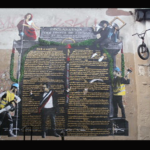 The French Revolution’s motto was liberté, egalité, fraternité (liberty, equality, fraternity). It abolished the absolutist monarchy (Louis XIV: ‘I am the state’) and established a new system of rule. Feudal power structures were replaced with governance by the majority population and the royal family was executed. The revolution is seen as one of the Enlightenment’s decisive events, and its importance extends to how it addressed human rights, democracy and forms of government. However, the period of revolutionary terror, which sent all perceived enemies of the revolution within France to the guillotine, is usually judged critically. For example, Olympe de Gouges was executed in 1793 when she demanded universal human rights for women as well as men. In 1799, General Napoléon Bonaparte assumed the rank of First Consul of the republic, asserting absolute dictatorial power, which he later confirmed by declaring himself Emperor. At the same time, France had colonies. In fact, in the 19th century, it was the second largest colonial power in the world. Neither equality nor inalienable human rights applied to these areas.
The French Revolution’s motto was liberté, egalité, fraternité (liberty, equality, fraternity). It abolished the absolutist monarchy (Louis XIV: ‘I am the state’) and established a new system of rule. Feudal power structures were replaced with governance by the majority population and the royal family was executed. The revolution is seen as one of the Enlightenment’s decisive events, and its importance extends to how it addressed human rights, democracy and forms of government. However, the period of revolutionary terror, which sent all perceived enemies of the revolution within France to the guillotine, is usually judged critically. For example, Olympe de Gouges was executed in 1793 when she demanded universal human rights for women as well as men. In 1799, General Napoléon Bonaparte assumed the rank of First Consul of the republic, asserting absolute dictatorial power, which he later confirmed by declaring himself Emperor. At the same time, France had colonies. In fact, in the 19th century, it was the second largest colonial power in the world. Neither equality nor inalienable human rights applied to these areas.
Further Reading:
*Edmundo Murray (2008): Review of Jean Ziegler’s “La haine de l’Occident”.
OK
The greatest difficulty with our boys is to overcome their innate aversion to work. You have to know that they are the children of born beggars.
Correct!
The greatest difficulty with our boys is to overcome their innate aversion to work. You have to know that they are the children of born beggars.
Year:
Author Bio:
Anonymous priest who evangelised among the Lakota Sioux in North America about his pupils.
Source:
Quote: Jasmin Lörchner (23.11.2016): Wie die Sioux katholisch wurden. In: Spiegel Online. The year (1900) is an approximation.
Picture: Wikimedia
Context:
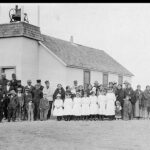 Lakota spirituality was fundamentally different from Christianity. They believed that they only thrived thanks to nature’s benevolence and did not consider humans to be the pinnacle of creation. Sitting Bull and many others protested against the confinement of the Sioux (to which the Lakota belong) in reservations, and against living conditions in them. The Sioux also rejected attempts to forcibly assimilate them, as well as Christianity – missionary work was brutal and involved in the colonial subjugation and exploitation of Native Americans.
Lakota spirituality was fundamentally different from Christianity. They believed that they only thrived thanks to nature’s benevolence and did not consider humans to be the pinnacle of creation. Sitting Bull and many others protested against the confinement of the Sioux (to which the Lakota belong) in reservations, and against living conditions in them. The Sioux also rejected attempts to forcibly assimilate them, as well as Christianity – missionary work was brutal and involved in the colonial subjugation and exploitation of Native Americans.
Further Reading:
*MariJo Moore (2003): Genocide of the Mind. New Native American Writing. New York: Nation Books.
OK
Leave the Oil in the Soil, Leave the Coal in the Hole, Leave the Gas under the Grass.
Correct!
Leave the Oil in the Soil, Leave the Coal in the Hole, Leave the Gas under the Grass.
Year:
Author Bio:
Grassroots initiative from South America.
Source:
Imperial College London (2014). Event ‘Leave the Oil in the Soil, Leave the Coal in the Hole, Leave the Gas under the Grass‘
Context:
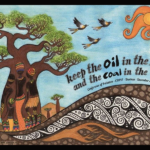 At the climate summit in Copenhagen in December 2009, grassroots initiatives from South America presented their campaign Keep the oil in the soil! Keep the coal in the hole! The exploitation of fossil fuels destroys living spaces (often those belonging to poor and racialised groups) and is responsible for climate change. In 2007, under pressure from social movements, the Ecuadorian government proposed to not exploit the oil wells in the Yasuní biosphere reserve. The German government was involved in letting this initiative come to nothing.
At the climate summit in Copenhagen in December 2009, grassroots initiatives from South America presented their campaign Keep the oil in the soil! Keep the coal in the hole! The exploitation of fossil fuels destroys living spaces (often those belonging to poor and racialised groups) and is responsible for climate change. In 2007, under pressure from social movements, the Ecuadorian government proposed to not exploit the oil wells in the Yasuní biosphere reserve. The German government was involved in letting this initiative come to nothing.
Further Reading:
*EJOLT Press release (2013): Unburnable fuels. How to keep the oil in the soil.
OK
In the neighbouring village, they invited twenty women from the mothers’ club to donate food and then told them they wanted to vaccinate them. In reality, this was an anaesthetic, after which they were sterilised.
Correct!
In the neighbouring village, they invited twenty women from the mothers’ club to donate food and then told them they wanted to vaccinate them. In reality, this was an anaesthetic, after which they were sterilised.
Year:
Author Bio:
Anonymous interviewee, Andean highlands of Peru, interview by Susanne Schultz.
Source:
Schultz, Susanne (2006, in German): Hegemonie, Gouvernementalität, Biomacht. Reproduktive Risiken und die Transformation internationaler Bevölkerungspolitik. Münster: Westfälisches Dampfboot, p. 11.
Context:
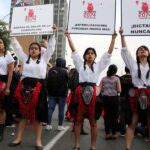 Between 1995 and 1998, under the Fujimori government in Peru (1990-2000), around 300,000 women and men were sterilised, especially in poor districts and among the indigenous population. While many women initially used the programme as a means of voluntary sterilisation, it gradually became a coercive measure. International population control programmes have long deployed and continue to deploy various means to try to achieve maximum demographic impact. For example, by sterilising as many women as possible or by inducing them to use contraceptive methods (preferably long-term), be it through “incentives”, i.e. gifts via quotas in the health system or, as shown in this quote, through direct coercion and deception.
Between 1995 and 1998, under the Fujimori government in Peru (1990-2000), around 300,000 women and men were sterilised, especially in poor districts and among the indigenous population. While many women initially used the programme as a means of voluntary sterilisation, it gradually became a coercive measure. International population control programmes have long deployed and continue to deploy various means to try to achieve maximum demographic impact. For example, by sterilising as many women as possible or by inducing them to use contraceptive methods (preferably long-term), be it through “incentives”, i.e. gifts via quotas in the health system or, as shown in this quote, through direct coercion and deception.
Further Reading:
OK
The emancipation of women is not an act of charity, the result of a humanitarian or compassionate attitude. The liberation of women is a fundamental necessity for the revolution, the guarantee of its continuity and the precondition for its victory. The main objective of the revolution is to destroy the system of exploitation and build a new society which releases the potentialities of human beings, reconciling them with labour and with nature.
Correct!
The emancipation of women is not an act of charity, the result of a humanitarian or compassionate attitude. The liberation of women is a fundamental necessity for the revolution, the guarantee of its continuity and the precondition for its victory. The main objective of the revolution is to destroy the system of exploitation and build a new society which releases the potentialities of human beings, reconciling them with labour and with nature.
Year:
Author Bio:
Samora Machel (1933-1986) was the first president of Mozambique after its independence in 1975. He died in a plane crash. The causes of the accident are unclear.
Source:
Stephanie Urdang (1989): And still they Dance: Women, War and the Struggle for Change in Mozambique. New York: Monthly Review Press, p. 96.
Context:
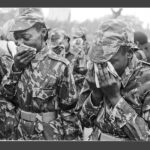 In many liberated countries, the post-decolonisation period inaugurated a time of transformation, during which political, cultural and economic utopias were articulated and put into practice. Feminism was often of great importance within decolonial struggles, enabling a joint fight against colonial supremacy which cut across gender boundaries. But even if women played a leading role during upheavals and revolutions (Mugo 2010), in subsequent phases, patriarchal role models were again invoked (Linhard 2005). The picture was taken at Machels funeral.
In many liberated countries, the post-decolonisation period inaugurated a time of transformation, during which political, cultural and economic utopias were articulated and put into practice. Feminism was often of great importance within decolonial struggles, enabling a joint fight against colonial supremacy which cut across gender boundaries. But even if women played a leading role during upheavals and revolutions (Mugo 2010), in subsequent phases, patriarchal role models were again invoked (Linhard 2005). The picture was taken at Machels funeral.
Further Reading:
*Micere Mugo (2010): Die Rolle der Frauen in afrikanischen Befreiungsbewegungen – Ein illustratives Beispiel aus Kenia. In: Africavenir (Hrsg.): 50 Jahre afrikanische Un-Abhängigkeiten – Eine (selbst)kritische Bilanz, S. 48-55.
*Tabea Alexa Linhard (2005): Fearless Women in the Mexican Revolution and Spanish Civil War. Columbia: University of Missouri Press.
*Le Monde Diplomatique (Augusta Conchiglia, 11/2017): The mysterious death of Samora Machel.
OK
For a long time we lived under the dictatorship of the Communists, but now we have found out that life under the dictatorship of business people is no better. They couldn’t care less about what country they are in.
Correct!
For a long time we lived under the dictatorship of the Communists, but now we have found out that life under the dictatorship of business people is no better. They couldn’t care less about what country they are in.
Year:
Author Bio:
Grigori Gorin (1940-2000) was a Russian-Jewish doctor, screenwriter, and novelist.
Source:
Boris Kagarlitsky (1994): Square Wheels: How Russian Democracy got Derailed. New York: Monthly Review Press, p. 191.
Context:
 Through the transformation processes of glasnost (public) and perestroika (reorganisation), Mikhail Gorbachev, President of the Soviet republics, attempted to orchestrate a democratic transition in the Soviet Union. However, since Russia was heavily indebted, it had to implement economic reforms in order to get credit. With the dissolution of the USSR, Russian President Boris Yeltsin deposed Gorbachev and ruled by special decree for a year during the economic crisis. Valuable state property was sold off. For example, 40% of the oil company which had annual sales of around US$ 190 billion (2006) was sold for US$ 88 million (Klein 2007: 232). In 1999, he handed power to Putin, whose first act was to guarantee Yeltsin immunity (ibid.: 237).
Through the transformation processes of glasnost (public) and perestroika (reorganisation), Mikhail Gorbachev, President of the Soviet republics, attempted to orchestrate a democratic transition in the Soviet Union. However, since Russia was heavily indebted, it had to implement economic reforms in order to get credit. With the dissolution of the USSR, Russian President Boris Yeltsin deposed Gorbachev and ruled by special decree for a year during the economic crisis. Valuable state property was sold off. For example, 40% of the oil company which had annual sales of around US$ 190 billion (2006) was sold for US$ 88 million (Klein 2007: 232). In 1999, he handed power to Putin, whose first act was to guarantee Yeltsin immunity (ibid.: 237).
Further Reading:
*Aris Chatzistefanou & Katerina Kitidi (2012): Katastroika. Documentary.
*Naomi Klein (2007): The Shock Doctrine. The Rise of Disaster Capitalism. Toronto: Knopf Canada.
OK
Since European contact Aboriginal people, such as myself, have been constructed as “straight”. This cultural default has contributed to the difficulty of proving so-called “real accounts” of sexual and gender diversity of Aboriginal people prior to European contact. (…) It is not inconceivable that homophobia and transphobia are practices introduced by the Christian missionaries. The social order of the missions, in an attempt to “civilise the natives”, limited Aboriginal expression.
Correct!
Since European contact Aboriginal people, such as myself, have been constructed as “straight”. This cultural default has contributed to the difficulty of proving so-called “real accounts” of sexual and gender diversity of Aboriginal people prior to European contact. (…) It is not inconceivable that homophobia and transphobia are practices introduced by the Christian missionaries. The social order of the missions, in an attempt to “civilise the natives”, limited Aboriginal expression.
Year:
Author Bio:
Troy-Anthony Baylis (born in 1976) is a Jawoyn Aboriginal from northern Australia. He is an artist, curator and writer.
Source:
Troy-Anthon Baylis (15.04.2014): The art of seeing Aboriginal Australia’s queer potential. In: The Conversation.
Context:
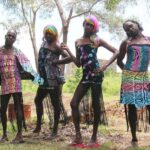 Troy-Anthon Baylis researches gender diversity and has found that there are indigenous names for non-binary genders on the Australian Tiwi Islands (The Hook Up 2018). Non-heterosexual concepts such as “two-spirit” in North America, were part of sexuality in many pre-colonial societies. These were viewed by the Christian Church and colonialists as immoral reprehensible and therefore forbidden. In the Catholic Church, homosexuality and non-procreative sex were condemned as early as the Third Lateran Council of 1179 (Boswell 1981, quoted from Federici, 2014: 47) as a sin against nature (Spencer 1995, quoted from Federici, 2014: 47).
Troy-Anthon Baylis researches gender diversity and has found that there are indigenous names for non-binary genders on the Australian Tiwi Islands (The Hook Up 2018). Non-heterosexual concepts such as “two-spirit” in North America, were part of sexuality in many pre-colonial societies. These were viewed by the Christian Church and colonialists as immoral reprehensible and therefore forbidden. In the Catholic Church, homosexuality and non-procreative sex were condemned as early as the Third Lateran Council of 1179 (Boswell 1981, quoted from Federici, 2014: 47) as a sin against nature (Spencer 1995, quoted from Federici, 2014: 47).
Further Reading:
*The Hook Up (2018): What do we know about queer Indigenous history?
*Silvia Federici (2014): Caliban und die Hexe. Frauen, der Körper und die ursprüngliche Akkumulation. Wien: Mandelbaum.
*Pearson McKinney (2016): Before European Christians Forced Gender Roles, Native Americans Acknowledged 5 Genders.
**Arabmediasociety.com, 21.01.2009: Book Review Desiring Arabs.
OK
It seems that the Germans will never forgive us for Auschwitz
Correct!
It seems that the Germans will never forgive us for Auschwitz
Year:
Author Bio:
Austria-Hungary, Zvi Rix, 1968
Source:
The Jews in Germany now, Leo Katcher 1968.
Context:
Born in Austria-Hungary in 1909, the Jewish doctor first worked in Vienna. After the National Socialists came to power, he fled and devoted himself to psychoanalysis with a focus on generational trauma processing. He emigrated to Israel where he lived until his death.
Further Reading:
OK
When the social body of the country has been contaminated by a disease that corrodes its entrails, it forms antibodies. These antibodies cannot be considered in the same way as microbes. As the government controls and destroys the guerrilla, the action of the antibody will disappear, as is already happening. It is only a natural reaction to a sick body.
Correct!
When the social body of the country has been contaminated by a disease that corrodes its entrails, it forms antibodies. These antibodies cannot be considered in the same way as microbes. As the government controls and destroys the guerrilla, the action of the antibody will disappear, as is already happening. It is only a natural reaction to a sick body.
Year:
Author Bio:
César Augusto Guzzetti (1925-1988) was foreign minister during the Argentine junta that took power in 1976. Although he survived being shot by left-wing guerrillas in May 1977, he had to leave his post.
Source:
Quoted by Naomi Klein (2007): The Shock Doctrine. The Rise of Disaster Capitalism. Toronto: Knopf Canada, p. 113
Context:
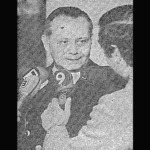 Disease metaphors have been and still are frequently used in politics to refer to complicated social processes and to justify drastic political measures. The Nazi doctor Fritz Klein said ‘The Jew is an inflamed appendix in the body of mankind.’ The Khmer Rouge justified mass executions in Cambodia this way: ‘What is infected must be cut out’ (cf. Klein 2007: 114). Susan Sontag (1981) wrote that the use of disease metaphors such as cancer justifies strict measures and is “as such implicitly genocidal.”
Disease metaphors have been and still are frequently used in politics to refer to complicated social processes and to justify drastic political measures. The Nazi doctor Fritz Klein said ‘The Jew is an inflamed appendix in the body of mankind.’ The Khmer Rouge justified mass executions in Cambodia this way: ‘What is infected must be cut out’ (cf. Klein 2007: 114). Susan Sontag (1981) wrote that the use of disease metaphors such as cancer justifies strict measures and is “as such implicitly genocidal.”
Further Reading:
*Susan Sontag (1978): Illness as Metaphor. New York: Farrar, Straus & Giroux.
OK
I already heard white people say N**** to me in kindergarten
Don’t question the clichés, now knock down brothers
We demand more than equal rights, we want peace at last
Having new goals and not having the image of dealers
A motion is being discussed in the state parliament
And meanwhile, the next Nazi is planning his attack
The shameful deed is regretted, but I wonder:
“Why is there another black family at the grave?”
Correct!
I already heard white people say N**** to me in kindergarten
Don’t question the clichés, now knock down brothers
We demand more than equal rights, we want peace at last
Having new goals and not having the image of dealers
A motion is being discussed in the state parliament
And meanwhile, the next Nazi is planning his attack
The shameful deed is regretted, but I wonder:
“Why is there another black family at the grave?”
Year:
Author Bio:
Brothers Keepers is an association of predominantly black musicians who have come together in response to the increasing racism in Germany to draw attention to the difficult, sometimes life-threatening situation of people with a history of migration, black people and people of color. The lyrics come from the song “Adriano (Letzte Warnung)”, the part of the quote is rapped by Samy Deluxe and D-Flame.
Source:
Brothers Keepers (2001): Adriano (Last Warning).
Context:
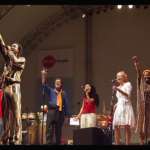 In their song ‘Adriano’, the band Brothers Keepers, a group of mainly black musicians from Germany, sings about the murder of Alberto Adriano on June 5, 2000. Adriano Alberto, father of three children, was brutally beaten up by three Nazis and died of his injuries a few days later. With this song, Brothers Keepers also wanted to draw attention to the increasing racism, which was particularly noticeable after the fall of the Berlin Wall. Criticism was also directed towards politics, the lack of interest in racism and the people affected by racism. This song is also understood as a form of resistance and a statement by self-organized Black musicians who no longer want to accept racism in Germany.
In their song ‘Adriano’, the band Brothers Keepers, a group of mainly black musicians from Germany, sings about the murder of Alberto Adriano on June 5, 2000. Adriano Alberto, father of three children, was brutally beaten up by three Nazis and died of his injuries a few days later. With this song, Brothers Keepers also wanted to draw attention to the increasing racism, which was particularly noticeable after the fall of the Berlin Wall. Criticism was also directed towards politics, the lack of interest in racism and the people affected by racism. This song is also understood as a form of resistance and a statement by self-organized Black musicians who no longer want to accept racism in Germany.
Further Reading:
*Advanced Chemistry (1992): Fremd im eigenen Land.
*Samy Deluxe (2001): Wake me up.
*SXTN (2016): I am black.
*Ah Nice (2016): I am black.
OK
“It was only now that I realized how difficult it would be for me to find a suitable job because of my African origin, because although I was gifted, no one thought of letting me learn a profession.”
Correct!
“It was only now that I realized how difficult it would be for me to find a suitable job because of my African origin, because although I was gifted, no one thought of letting me learn a profession.”
Year:
Author Bio:
Henriette Alexander (1817-1895), born in Stuttgart, was the daughter of African valets, who herself worked as a teacher in various places.
Source:
Quote translated after: handwritten notes by Henriette Alexander, in: Monatsblatt von Beuggen, Mai 1895, Nr. 4, p. 30-32.
Picture: Findagrave.
Context:
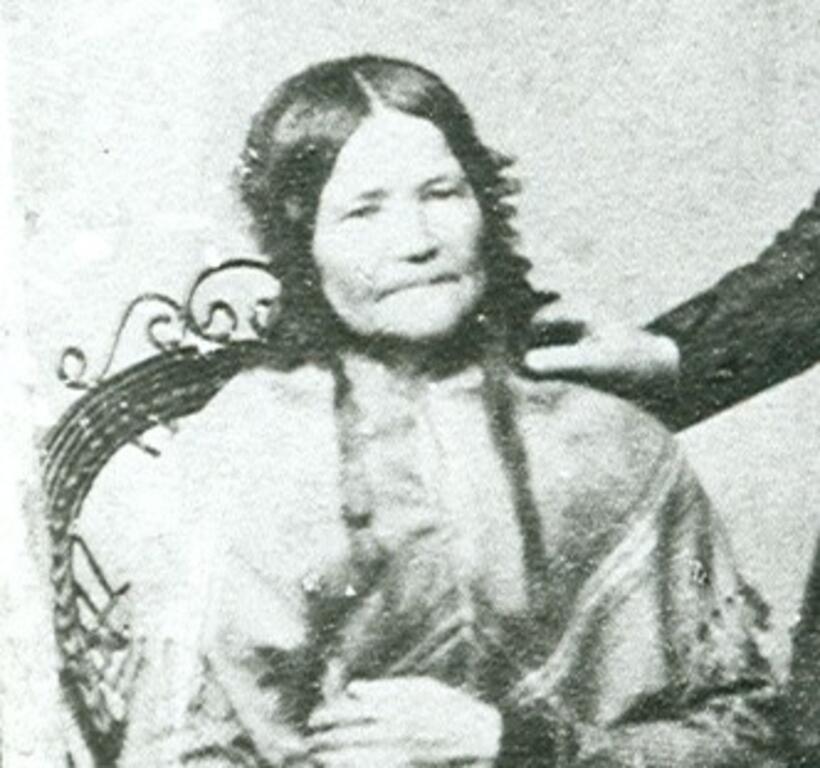 The quote comes from Henriette Alexander’s own notes about her life. As the daughter of so-called African valets, she lived in dependency throughout her life. She was very gifted and as she read a lot, especially the Bible. In her notes, she describes the various stages of her life as a teacher. In the quote, she expresses that despite her talents, she was never able to achieve independence in her home or profession. She was denied equality and freedom because of her African heritage.
The quote comes from Henriette Alexander’s own notes about her life. As the daughter of so-called African valets, she lived in dependency throughout her life. She was very gifted and as she read a lot, especially the Bible. In her notes, she describes the various stages of her life as a teacher. In the quote, she expresses that despite her talents, she was never able to achieve independence in her home or profession. She was denied equality and freedom because of her African heritage.
Further Reading:
*Monika Firla (2001): Exotisch – höfisch – bürgerlich. Afrikaner in Württemberg vom 15. bis 19. Jahrhundert. Katalog zur Ausstellung des Hauptarchivs Stuttgarts: Stuttgart.
*Helen Whittle (13.11.2012): Homestory Deutschland.
OK
Surplus from Africa was partly used to offer a few more benefits to European workers and served as a bribe to make the latter less revolutionary. The bribe came in the form of increased wages, better working conditions, and expanded social services. The benefits of colonialism were diffused throughout European society in many ways. (…) Meanwhile, the capitalist still made his fortune by ensuring that the Ivory Coast or Colombian grower got no
price increases.
Correct!
Surplus from Africa was partly used to offer a few more benefits to European workers and served as a bribe to make the latter less revolutionary. The bribe came in the form of increased wages, better working conditions, and expanded social services. The benefits of colonialism were diffused throughout European society in many ways. (…) Meanwhile, the capitalist still made his fortune by ensuring that the Ivory Coast or Colombian grower got no
price increases.
Year:
Author Bio:
Walter Rodney (1942-1980) was a Marxist historian and politician from Guyana. Born into a working-class family, he studied in Guyana and Jamaica and taught in Germany and Tanzania. He was killed in a bomb attack in 1980 while campaigning for the Working People’s Alliance election campaign. In 2015, a commission of inquiry found that the attack had originated from within the Guyanese government.
Source:
Quote: Walter Rodney (1975): Afrika. Die Geschichte einer Unterentwicklung. Berlin: Klaus Wagenbach, p. 173, German edition.
Picture: Wikimedia
Context:
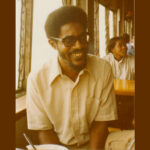 The main beneficiaries of colonial conquest and plunder were European companies and colonial states. In addition, both the resources that were stolen from colonised areas and the exploitation of their people helped to defuse conflicts between labour and capital in the metropolises. There, the working classes were given a share of colonial exploitation through, for example, the cheap availability of consumer goods such as sugar and coffee. This encouraged the European working class to show solidarity with the ruling class in their own country rather than with the dispossessed on other continents. In order to achieve this cross-class “solidarity”, discourses of racism and national unity were also deployed, especially from the 19th century onwards.
The main beneficiaries of colonial conquest and plunder were European companies and colonial states. In addition, both the resources that were stolen from colonised areas and the exploitation of their people helped to defuse conflicts between labour and capital in the metropolises. There, the working classes were given a share of colonial exploitation through, for example, the cheap availability of consumer goods such as sugar and coffee. This encouraged the European working class to show solidarity with the ruling class in their own country rather than with the dispossessed on other continents. In order to achieve this cross-class “solidarity”, discourses of racism and national unity were also deployed, especially from the 19th century onwards.
Further Reading:
*Walter Rodney (1973): How Europe Underdeveloped Africa. London: Bogle-L’Ouverture Publications & Dar-Es-Salaam: Tanzanian Publishing House.
*Benedict Anderson (1983): Imagined Communities. Reflections on the Origins and Spread of Nationalism. London & New York: Verso.
OK
Poor countries – and poor people – differ from rich ones not only because they have less capital but because they have less knowledge (…) Indeed, even greater than the knowledge gap is the gap in the capacity to create knowledge.
Correct!
Poor countries – and poor people – differ from rich ones not only because they have less capital but because they have less knowledge (…) Indeed, even greater than the knowledge gap is the gap in the capacity to create knowledge.
Year:
Author Bio:
The World Bank is a Washington D.C. (USA) based multinational development bank. Its original purpose was to finance the reconstruction of states destroyed by World War II. Today its core task is to promote the economic development of “less developed” member states through financial aid, advice and technical assistance.
Source:
Weltbank, (1998/99): World Development Report: Knowledge for Development, New York: Oxford University Press, p. 1f.
Context:
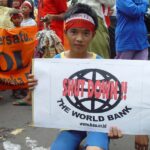 The World Bank evaluates the development status of countries according to the logic of Western capitalist economies. The assumption that only conformity with these standards can lead to progress in the Global South makes any recognition of non-Western values and world views impossible. From this prevailing development policy perspective, other ways of life and social forms are considered deficient. This is despite the fact the Western road to development – e.g. through the exploitation and destruction of people and nature – has not proven to be sustainable. Since its founding in 1946, the World Bank chairmen have all, with only two exceptions, been white, male US-Americans. Numerous social movements and NGOs in the Global North (attac) and South (Focus on the Global South) have been criticising and resisting World Bank policies for decades.
The World Bank evaluates the development status of countries according to the logic of Western capitalist economies. The assumption that only conformity with these standards can lead to progress in the Global South makes any recognition of non-Western values and world views impossible. From this prevailing development policy perspective, other ways of life and social forms are considered deficient. This is despite the fact the Western road to development – e.g. through the exploitation and destruction of people and nature – has not proven to be sustainable. Since its founding in 1946, the World Bank chairmen have all, with only two exceptions, been white, male US-Americans. Numerous social movements and NGOs in the Global North (attac) and South (Focus on the Global South) have been criticising and resisting World Bank policies for decades.
Further Reading:
*Grace Blakeley (2020): The Great World Bank Robbery: An Interview with Walden Bello (Podcast). Tribune Magazine.
OK
No government in the world would have tolerated having the main square of its capital occupied for eight weeks by tens of thousands of demonstrators who blocked the authorities from approaching the area in front of the main government building. (…) A crackdown was therefore inevitable. But its brutality was shocking (…)
Correct!
No government in the world would have tolerated having the main square of its capital occupied for eight weeks by tens of thousands of demonstrators who blocked the authorities from approaching the area in front of the main government building. (…) A crackdown was therefore inevitable. But its brutality was shocking (…)
Year:
Author Bio:
Henry Kissinger (born 1923) is a Republican politician and has held many positions, including that of US Secretary of State. He has been internationally criticised for his involvement in numerous government overthrows and for supporting authoritarian regimes (Argentina, Chile, Indonesia/East Timor). In 1973, he received the Nobel Peace Prize. In 2013, an endowed professorship was set up at the University of Bonn in his honour at the initiative of the Federal Republic of Germany’s then Interior Minister de Maizière and Foreign Minister Westerwelle.
Source:
Henry Kissinger (1. August 1989): The Caricature of Deng as a Tyrant is Unfair. Washington Post.
Context:
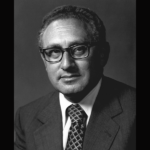 Former US Secretary of State Henry Kissinger was known for his support of authoritarian regimes around the world. He is accused, amongst other things, of being linked to the assassination of Salvador Allende in Chile in 1973 and the illegal bombing of Cambodian territory during the Vietnam War. In 1989, the pro-democracy movement in Beijing demonstrated in Tiananmen Square. The Chinese military brutally crushed protests, killing an estimated 2,000-7,000 and injuring 30,000. In the aftermath, 40,000 people were arrested and hundreds executed. According to Naomi Klein (2007: 185f.), referring to historian Maurice Meisner, China’s communist government cracked down hardest on factory workers. The liberal economic reforms in China in the 1980s (president Deng Xiaoping had taken advice from Milton Friedman, the neoliberal icon) did not produce the hoped-for political liberalisation.
Former US Secretary of State Henry Kissinger was known for his support of authoritarian regimes around the world. He is accused, amongst other things, of being linked to the assassination of Salvador Allende in Chile in 1973 and the illegal bombing of Cambodian territory during the Vietnam War. In 1989, the pro-democracy movement in Beijing demonstrated in Tiananmen Square. The Chinese military brutally crushed protests, killing an estimated 2,000-7,000 and injuring 30,000. In the aftermath, 40,000 people were arrested and hundreds executed. According to Naomi Klein (2007: 185f.), referring to historian Maurice Meisner, China’s communist government cracked down hardest on factory workers. The liberal economic reforms in China in the 1980s (president Deng Xiaoping had taken advice from Milton Friedman, the neoliberal icon) did not produce the hoped-for political liberalisation.
Further Reading:
*Democracy Now (11.08.2016): Declassified Documents Show Kissinger Role in Argentine Dirty War.
*Naomi Klein (2007): The Shock Doctrine. The Rise of Disaster Capitalism. Toronto: Knopf Canada.
OK
We have given jobs to every family that has lost their homes and land to the Dock Complex.
Correct!
We have given jobs to every family that has lost their homes and land to the Dock Complex.
Year:
Author Bio:
M.L. Meena (birthdate unknown) was Deputy Chairman of the Haldia Dock Complex in Calcutta, India.
Source:
Quoted in Samata Biwas (2016): Haldia: Logistics and its Other(s). Workshop-paper Kolkata Research Group.
Context:
 A lot of migration also takes place within states. When India freed itself from British colonial rule in 1947, the former colony was divided into the independent states of India and Pakistan. “For more than ten million people on both sides of the new border, this was tantamount to resettlement, flight and expulsion” (Federal Agency for Civic Education (2014): The Partition of British India 1947). Other forced migrations take place because of so-called development projects. The quote comes from the Kolkatta area of West Bengal, where many people were dispossessed for the construction of the dock and harbour complex. Many have been waiting for compensation for decades.
A lot of migration also takes place within states. When India freed itself from British colonial rule in 1947, the former colony was divided into the independent states of India and Pakistan. “For more than ten million people on both sides of the new border, this was tantamount to resettlement, flight and expulsion” (Federal Agency for Civic Education (2014): The Partition of British India 1947). Other forced migrations take place because of so-called development projects. The quote comes from the Kolkatta area of West Bengal, where many people were dispossessed for the construction of the dock and harbour complex. Many have been waiting for compensation for decades.
Further Reading:
*Samata Biswas (2017): Haldia, A Port City in India.
*Kalim Siddiqui (2012): Development and Displacement in India: Reforming the
Economy towards Sustainability.
OK
We live under a form of government which does not emulate the institutions of our neighbours; on the contrary we ourselves are the model, which some follow, rather than the imitators of other peoples. Our government is called a democracy because its administration is in the hands not of the few but of the majority.
Correct!
We live under a form of government which does not emulate the institutions of our neighbours; on the contrary we ourselves are the model, which some follow, rather than the imitators of other peoples. Our government is called a democracy because its administration is in the hands not of the few but of the majority.
Year:
Author Bio:
Pericles (ca. 495 – 429 BC) was an Athenian general and politician.
Source:
Dr. Fani Mallouchou-Tufano (2006): “The Restoration of the Athenian Acropolis.” Lecture at LSA.
Context:
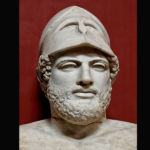 Athenian democracy is often seen as the basis of contemporary Western democracy. Within it, a significant part of the population took part in certain types of voting. However, women and enslaved people were excluded from voting, and Pericles is also credited with saying ‘The best woman is the one who speaks the least.’ The city-state of Athens had numerous colonies in the Mediterranean and along the Black Sea’s coasts. The so-called Great Colonisation took place mainly from the mid 8th to the mid 6th centuries B.C.E. Initially Greek traders settled, and they were then followed by others, while existing populations were expelled. During the debt crisis of 2009, the situation in Greece was described as post-colonial, because Greek domestic policy was externally determined (by the troika of the IMF, European Commission and Central Bank, Samaddar 2015).
Athenian democracy is often seen as the basis of contemporary Western democracy. Within it, a significant part of the population took part in certain types of voting. However, women and enslaved people were excluded from voting, and Pericles is also credited with saying ‘The best woman is the one who speaks the least.’ The city-state of Athens had numerous colonies in the Mediterranean and along the Black Sea’s coasts. The so-called Great Colonisation took place mainly from the mid 8th to the mid 6th centuries B.C.E. Initially Greek traders settled, and they were then followed by others, while existing populations were expelled. During the debt crisis of 2009, the situation in Greece was described as post-colonial, because Greek domestic policy was externally determined (by the troika of the IMF, European Commission and Central Bank, Samaddar 2015).
Further Reading:
*Ranabir Samaddar (2015): “The Postcolonial Bind of Greece.” Viewpointmag.
OK
You are the true Hyenas, that allure us with the fairness of your skins and when folly has brought us within your reach, you leap upon us. You are the traitors of Wisdom, the impediment to Industry… the clogs to Virtue and the goads that drive us to all vices, impiety and ruin.You are the Fool’s Paradise, the wiseman’s Plague and the Grand Error of Nature
Correct!
You are the true Hyenas, that allure us with the fairness of your skins and when folly has brought us within your reach, you leap upon us. You are the traitors of Wisdom, the impediment to Industry… the clogs to Virtue and the goads that drive us to all vices, impiety and ruin.You are the Fool’s Paradise, the wiseman’s Plague and the Grand Error of Nature
Year:
Author Bio:
Walter Charleton (1616-1707) was an English natural philosopher and doctor.
Source:
Walter Charleton (1659): Ephesian Matron. Quotet by Silvia Federici (2004: 163).
Context:
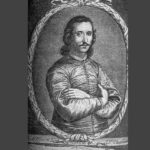 Time and again, women are used as scapegoats: from the biblical story in which Eve seduced Adam into taking a bite of the apple, to the witch hunts, where women were held responsible for all the social ills of the time. In this quote, women are accused, amongst other things, of driving men crazy through their sexual attractiveness. This inversion of responsibility is still used today, e.g. when a victim of sexual violence, rather than its perpetrator, is held culpable for the violence inflicted on them.
Time and again, women are used as scapegoats: from the biblical story in which Eve seduced Adam into taking a bite of the apple, to the witch hunts, where women were held responsible for all the social ills of the time. In this quote, women are accused, amongst other things, of driving men crazy through their sexual attractiveness. This inversion of responsibility is still used today, e.g. when a victim of sexual violence, rather than its perpetrator, is held culpable for the violence inflicted on them.
Further Reading:
*Silvia Federici (2004): Caliban and the Witch. Women, the Body and Primitive Accumulation. New York: Autonomedia.
OK
I told him that it was not honourable for a woman to love anyone else except her husband, and that this evil being among them, he himself was not sure that his son, who was there present, was his son. He replied: “Thou hast no sense. You French people love only your own children; but we love all the children of our tribe.” I began to laugh, seeing that he philosophised in horse and mule fashion.
Correct!
I told him that it was not honourable for a woman to love anyone else except her husband, and that this evil being among them, he himself was not sure that his son, who was there present, was his son. He replied: “Thou hast no sense. You French people love only your own children; but we love all the children of our tribe.” I began to laugh, seeing that he philosophised in horse and mule fashion.
Year:
Author Bio:
Paul Le Jeune was a French Jesuit who lived in Canada in the mid 17th century. The Jesuits wanted to evangelise and discipline the Montagnais-Naskapi. The Montagnais-Naskapi lived on the eastern Labrador Peninsula.
Source:
Eleanor Burke Leacock (1981): Myths of Male Dominance: Collected Articles on Women Cross-Culturally. New York: Monthly Review Press, p. 50. The year (1637) is an approximation.
Context:
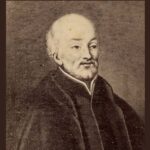 The missionary is surprised by the Montagnais-Naskapi’s generosity, sense of community and indifference to status, but at the same time shocked by their contempt for concepts such as possessiveness, authority (Leacock, 1981: 49) and male superiority (Leacock, 1981: 52), and at the fact that they do not punish their children. The coloniser Hernández de Córdoba was also surprised when in 1517 he landed on an island off the Yucatán peninsula in Mexico: there were so many female deities in the temples (Federici, 2014: 277) that he called it the “Isla de las Mujeres” (island of women). Europeans often viewed a lack of male authority as a lack of civilization.
The missionary is surprised by the Montagnais-Naskapi’s generosity, sense of community and indifference to status, but at the same time shocked by their contempt for concepts such as possessiveness, authority (Leacock, 1981: 49) and male superiority (Leacock, 1981: 52), and at the fact that they do not punish their children. The coloniser Hernández de Córdoba was also surprised when in 1517 he landed on an island off the Yucatán peninsula in Mexico: there were so many female deities in the temples (Federici, 2014: 277) that he called it the “Isla de las Mujeres” (island of women). Europeans often viewed a lack of male authority as a lack of civilization.
Further Reading:
*Silvia Federici (2004): Caliban and the Witch. Women, the Body and Primitive Accumulation. New York: Autonomedia.
*Howard Zinn (2015): A People’s History of the United States. New York: Harper Perennial.
OK
“[…] one who saves a single soul in the world is as if he has saved the whole world.”
Correct!
“[…] one who saves a single soul in the world is as if he has saved the whole world.”
Year:
Author Bio:
from the Babylonian Talmud
Source:
Quote: Babylonian Talmud, Sanhedrin 37a.
Picture: The Babylonian Talmud published by Daniel Bomberg 1519-1523.; Daniel Bomberg, Public domain, via Wikimedia Commons.
Context:
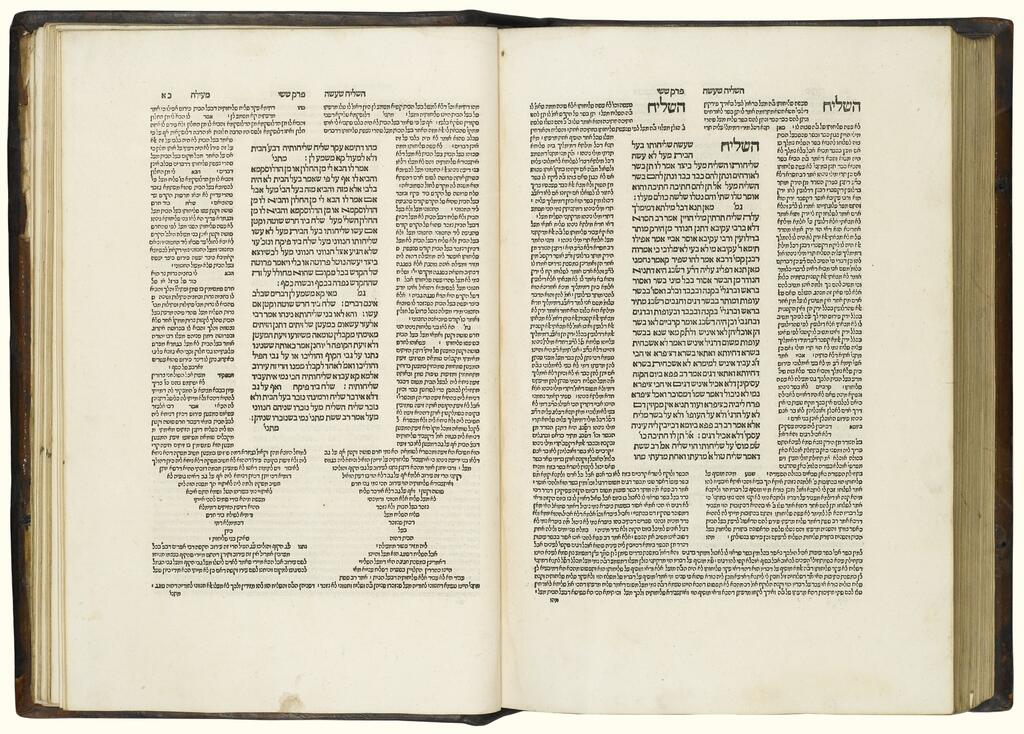 The quote comes from the Babylonian Talmud, which does not contain the Jewish religious laws themselves, but rabbinical interpretations of their application in practice. The quote expresses a strict reciprocity between people. It is a meta-halakhic – a universalist – principle that emphasizes the simultaneous universality and particularity of each and every human being. In this respect, it‘s claim comes close to the idea of human rights.
The quote comes from the Babylonian Talmud, which does not contain the Jewish religious laws themselves, but rabbinical interpretations of their application in practice. The quote expresses a strict reciprocity between people. It is a meta-halakhic – a universalist – principle that emphasizes the simultaneous universality and particularity of each and every human being. In this respect, it‘s claim comes close to the idea of human rights.
The quote from the Talmud has a central meaning for religious scholars such as Maimonides. The international memorial Yad Vashem honors the “Righteous Among the Nations” (those who saved Jews during the Shoah) with a medal engraved with this sentence from the Talmud.
Further Reading:
*Malka Simkovich (2016): The Making of Jewish Universalism: From Exile to Alexandria. United Kingdom: Lexington Books.
*Programme Yad Vashem medal of the Righteous: An Entire Universe.
OK
1500
to 1600
to 1700
to 1800
to 1850
to 1900
to 1925
to 1950
to 1975
to 1990
to 2000
to 2010
2011